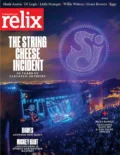Given the fact that 1973’s Brothers and Sisters was the album that prompted The Allman Brothers Band’s acension from relentless road dogs mostly booking theatres to rock stars co-headlining one of the larger music festivals ever- Watkins Glen, and its estimated audience of 600,000- one would think any and all stories surrounding that momentous and transitional period had been told. Like Ashley Kahn and his routinely revelatory and in-depth examinations of John Coltrane and Miles Davis, author Alan Paul has become the resident expert on all things Allman Brothers Band. With that reputation preceding him and affording trusted access, Paul, indeed, finds new things to share, not only about the Brothers’ climb to rock’s peak, but what came before and after.
Paul’s 300-page effort benefits from a trove of never-heard interviews with all of the principal characters- collected and conducted by ABB ‘Tour Mystic,’ Kirk West- making this journey essentially a new one, despite detailing a period of the legendary group when it was at its most visible. Paul understands better than anyone the significance of each step the Brothers took; from birth in 1969, through two tragic deaths, a leadership shift, and an album four years later that made them rock gods. Wisely, though, Paul also carries us through to the downslope; and why success isn’t an unconditional positive.
The album’s creation united a reconfigured band, following the deaths of founders Duane Allman and Berry Oakley, and introduces key replacements, Chuck Leavell, on keyboards, and Lamar Williams, on bass. It also necessitates the rise of Dickey Betts as ensemble leader, furthering a country music influence that began with Betts’ “Blue Sky,” on the preceding Eat a Peach, and produced the band’s chart pinnacle with “Ramblin’ Man.” Paul’s attention to Betts also explores the singer-guitarist’s growing affinity for Jerry Garcia, and the Brothers’ relationship with the Grateful Dead, that never saw more interaction and, perhaps, friendly competition than in ’73.
Paul’s best strength is his knack for striking the balance between the front page and the back- the disintegrating partnership with the Capricorn record label; the fraying interpersonal relationships within the group- over the course of becoming the biggest band in the land. Nothing is off-limits, nor is it mined for salacious effect. It’s candid and, more often than not, coming directly from the individuals, themselves. Brothers and sisters they were. Paul’s book gives us a seat at the table.



No Comments comments associated with this post